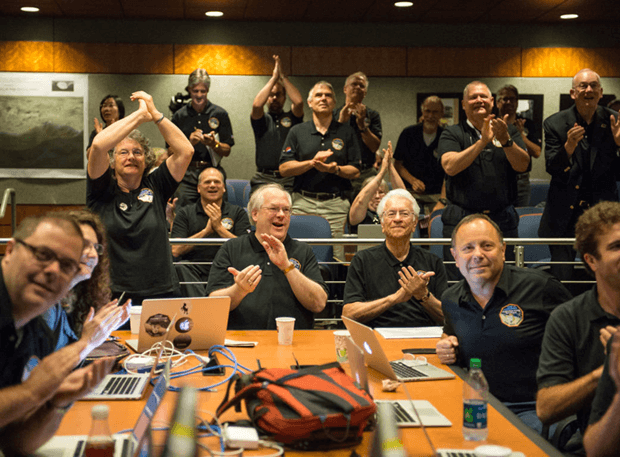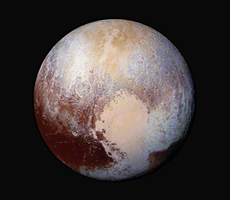- September 08, 2015
- By Chris Carroll
Today Matthew Hill M.S. ’98, Ph.D. ’01 is a space physicist who works on high-profile missions like the recent Pluto flyby, but his first brush with UMD was far from auspicious.
Unsure of his academic path and overwhelmed by the size and scope of the university, Hill bailed out only a week into his freshman year in 1989. He retreated to his hometown of Eatontown, N.J., took a job at a restaurant and played lead guitar in local clubs for a heavy metal band, Witchlord.
 What might sound like any parent’s nightmare gave him the time and freedom he needed to get his bearings.
What might sound like any parent’s nightmare gave him the time and freedom he needed to get his bearings.
“I wasn’t a great student in grammar school or high school—in high school particularly, I was distracted,” he says. “During that time [after dropping out of Maryland], I enrolled in community college, worked hard and I finally became a good student.”
After graduating, Hill bowed out of Witchlord and enrolled at Rutgers, where he earned a bachelor’s degree in physics in 1996 with high honors.
When it came time to choose graduate school, UMD’s acclaimed physics department was high on his list, and he viewed the College Park campus differently than seven years earlier. “The things that were problems as an undergrad—the size and scope and how much was going on—were positives when I was looking at grad school,” he said.
He took a job with Douglas C. Hamilton, today a professor emeritus of physics, who needed help crunching data from the two Voyager spacecraft. Launched in 1977, they later flew past many of the planets. (The probes now are approaching interstellar space and still sending back data.)
Hill thought his interest lay in nuclear physics, but as he worked, his fascination for the physics of space blossomed. He was carried back to his childhood, when he’d watched Carl Sagan on “Cosmos” and monitored reports about the Voyagers.

“It wasn’t long before I said, ‘Oh my God, I’m doing the exact stuff I was interested in as a kid, even working on one of the projects that fascinated me then,’” Hill says.
After completing two degrees, he stayed at UMD as a postdoctoral researcher working with other space probes, including the Cassini mission to explore Saturn. In 2005 he moved to his current job as a physicist at the Johns Hopkins University Applied Physics Laboratory in Laurel, Md.
“I’ve had several very good doctoral students, and Matt was one of the best,” Hamilton says.
So what exactly are space physicists, and how do they differ from astronomers or astrophysicists? There’s some overlap between the fields, Hamilton says, but space physicists generally study physical phenomena inside our own solar system, including the behavior of solar particles and radiation, and how such things interact with the planets.
That’s what Hill is studying on the New Horizons mission, which reached Pluto with much hoopla in July, revising our understanding of the planet’s geography.
As the instrument scientist for the probe’s Pluto Energetic Particle Spectrometer Science Investigation (PEPSSI), Hill is studying how neutral nitrogen molecules that escape from Pluto’s thin atmosphere become much more energetic charged ions through interaction with the solar wind—particles streaming from the Sun—and what happens to the ions after that. For instance, do they fly out to the edge of the solar system and bounce back further energized as a type of cosmic ray?
He’s now working on the preparations for Solar Probe Plus, a 2018 mission designed to dip into and test the solar atmosphere, traveling closer to the Sun than any spacecraft has ever gone.
“All the previous missions were either flying or already built when I became involved,” Hill says. “With the solar probe, I’ve been involved since the proposal stage. It’s really kind of a thrill to work on the instrument beforehand and help shape the mission from the beginning.”

